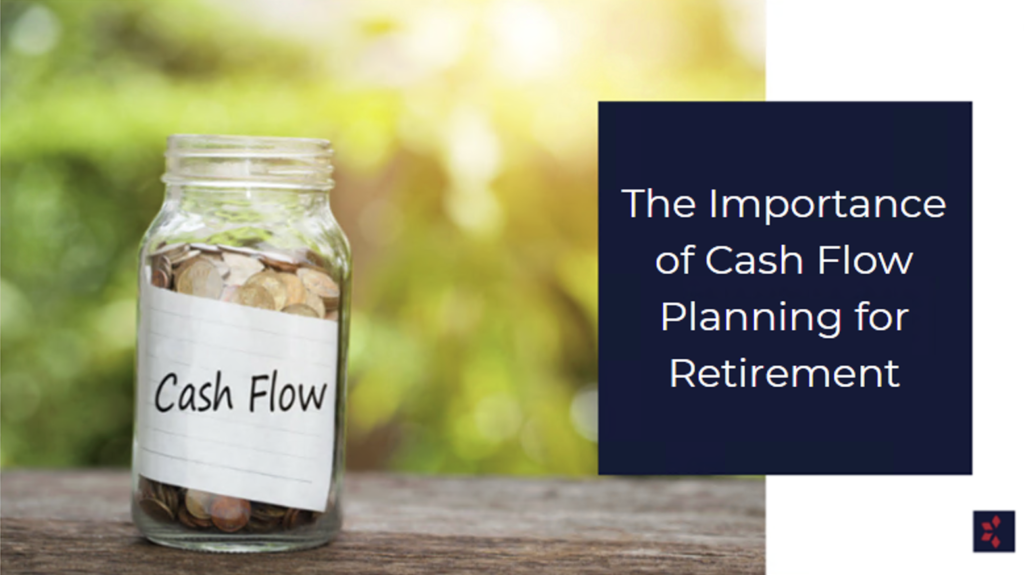The Importance of Cash Flow Planning for Retirement

Cash flow planning is the foundation of a fully comprehensive financial plan that includes your retirement years. As with any component of a financial plan, the sooner you start, the more effective your plan will be.
What is Cash Flow Planning?
Many confuse cash flow planning with budgeting. Budgeting is a part of cash flow planning and focuses more on managing expenses over the shorter term. Cash flow planning considers the short-term and the long-term, including retirement.
The planning process considers current and future income and expenses including housing, children’s education, and other foreseeable big-ticket purchases. Cash flow planning is crucial to your overall financial plan.
Why is Cash Flow Stability Important in Retirement?
Cash flow planning provides a realistic strategy for funding your retirement that balances your current financial needs with your expected needs in your retirement years. By balancing ongoing and future expenses with your assets and income you will have a greater assurance of cash flow stability throughout your retirement.
Cash flow stability provides retirees with the financial assurance to enjoy their retirement years without the stress of money worries as long as they stick to their plans. A proper cash flow plan will cover daily expenses, leisure activities, hobbies, healthcare and travel and provide an allowance for unexpected expenses that may arise.
Ways to Achieve Cash Flow for Retirement
With the decline in employer retirement benefits, Canadians are increasingly on their own to provide for adequate income in their retirement. Therefore, your retirement plan must include stable and diversified sources of cash flow.
Registered Retirement Savings Plan and Registered Retirement Income Fund
In general, the most useful savings vehicle for retirement is a Registered Retirement Savings Plan (RRSP). A RRSP must be converted to a Registered Retirement Income Fund (RRIF) by the end of the calendar year you turn 71. You can withdraw money from your RRSP at any time, but once converted to a RRIF you are required to make a minimum withdrawal each year.
Withdrawals from either a RRIF or a RRSP are taxable when you receive them but investments within these plans can continue to grow tax-deferred.
Tax-Free Savings Account (TFSA)
A TFSA is another type of registered plan. A TFSA accumulates investment returns tax-free meaning you pay no taxes on the withdrawals you make from your TFSA, whether before or after retirement. You can systematically withdraw money from your TFSA to meet cash flow needs.
Create a Cash Flow Portfolio
As your retirement approaches, you should transition your investment portfolios (whether within your RRSPs, RRIFs, TFSAs or other non-registered account) to provide income, for instance by investing in dividend-paying equities. That way you can withdraw cash from the portfolios without having to sell your investments.
If you are fortunate to have excess cash beyond your contribution limits to registered plans, then invest in tax-efficient portfolios that may also focus on dividend-paying equities for your retirement needs.
Work Longer
Delaying retirement or continuing to work part-time can help delay your reliance on your investment portfolios for cash flow. This can also allow your investments more time to grow before you retire and therefore potentially provide you with greater cash flow in retirement.
In Conclusion
Retirement means you will be making decisions about where you want to live, what you want to do, and what your desired standard of living will be. You will need to ensure that you have saved enough to provide the cash flow for the lifestyle you want in retirement and that the cash flow from all sources of income in retirement is as tax-efficient as possible.
Getting the help of a financial planning professional with your planning process will greatly facilitate achieving a stable cash flow in your retirement.
Build your Cash Flow for Retirement with Bloom Investment Counsel, Inc.
Established in 1985, Bloom Investment Counsel, Inc. is a Toronto-based independent investment management firm that specializes in creating and actively managing diversified, customized portfolios of Canadian and U.S. dividend-paying stocks for high-net-worth individuals and families, family offices, foundations, corporations, institutions, and trusts. Our customized dividend-paying investment portfolios can help you generate an additional stream of income for easy cash flow during retirement, if desired, while continuing to preserve and build wealth. For more information, call us today at +1-416-861-9941 or email us at info@bloominvestmentcounsel.com
This content is provided for general informational purposes only and does not constitute financial, investment, tax, legal or accounting advice nor does it constitute an offer or solicitation to buy or sell any securities referred to. Individual circumstances and current events are critical to sound investment planning; anyone wishing to act on this content should consult with his or her financial partner or advisor.